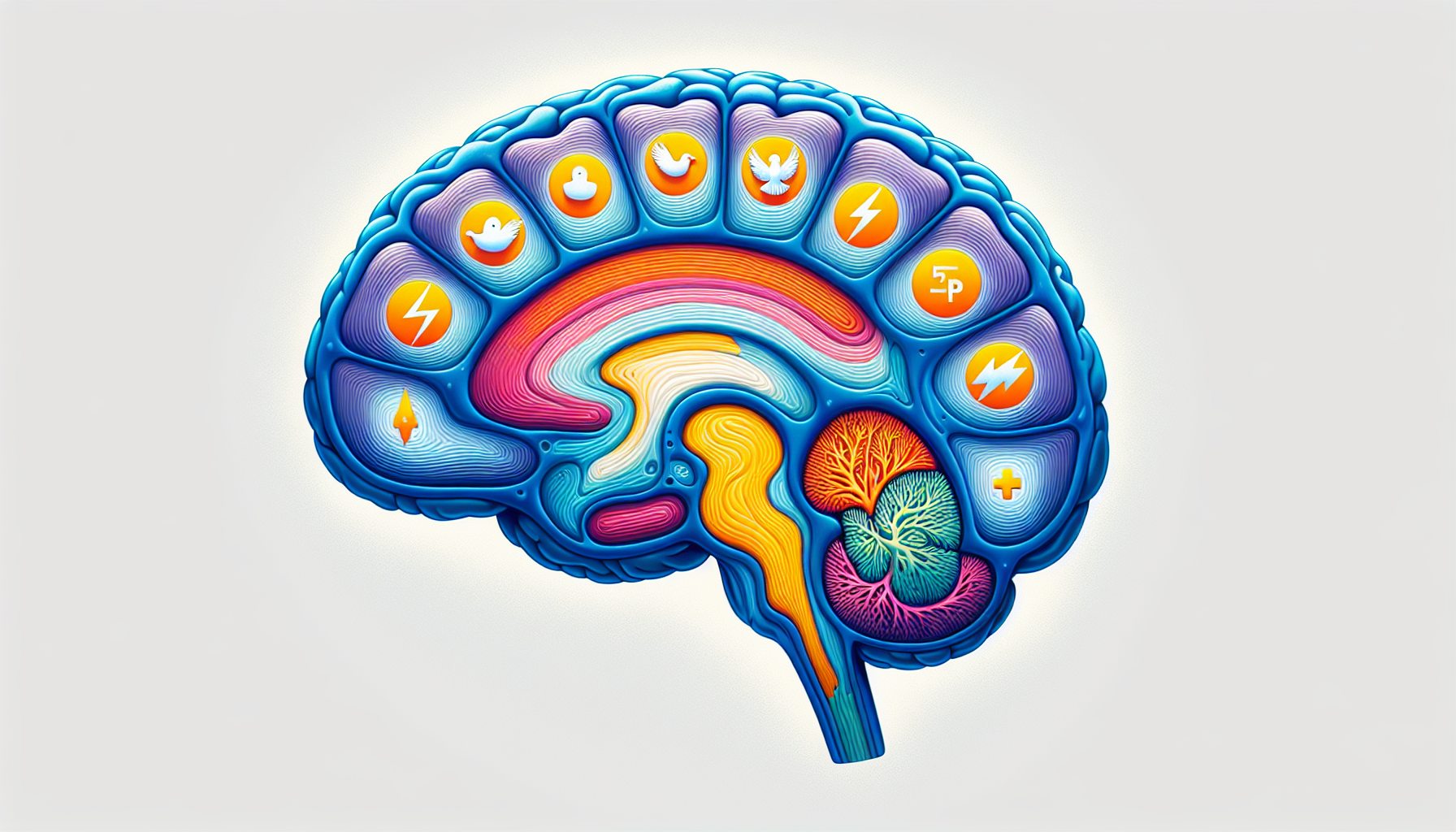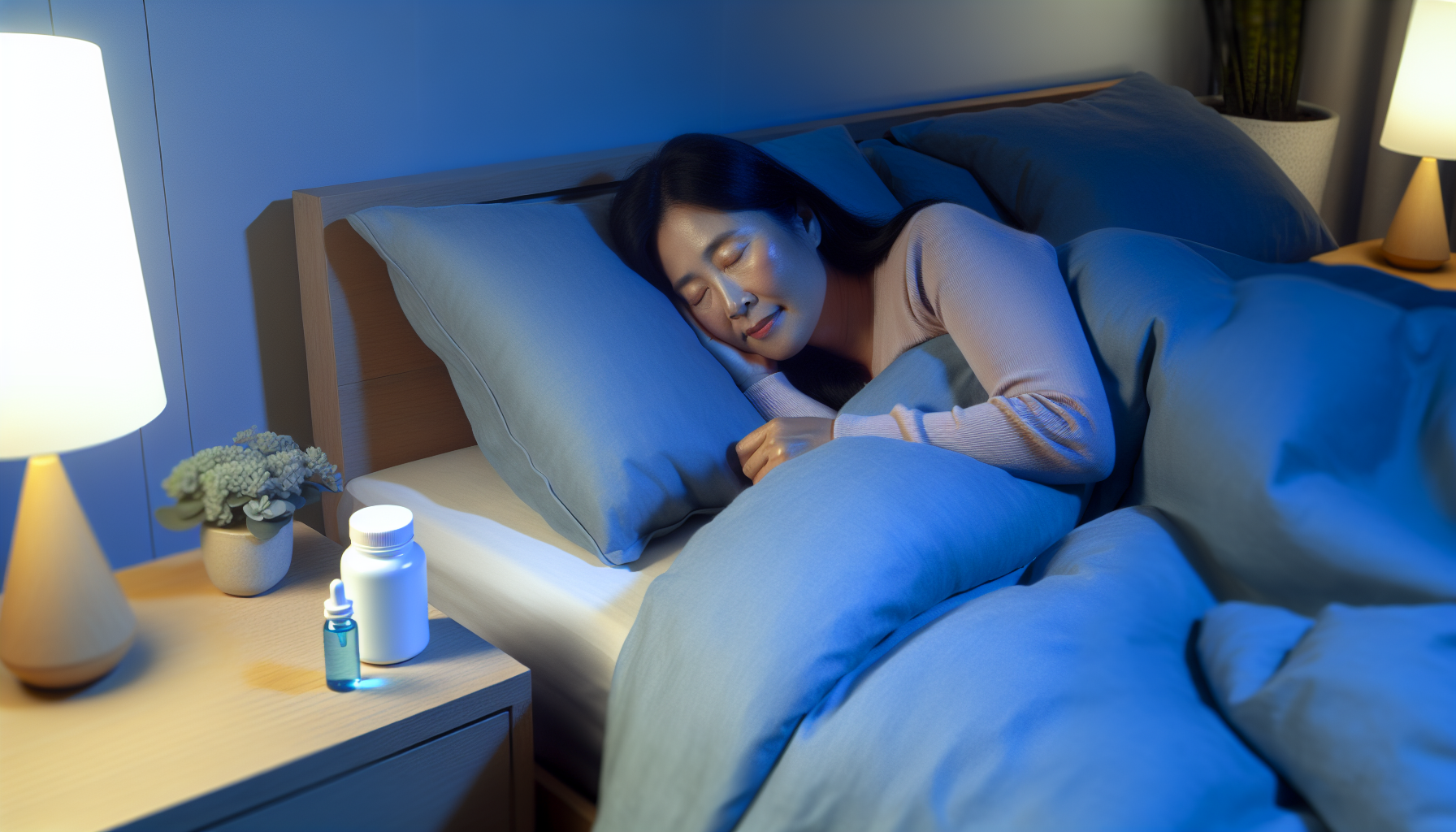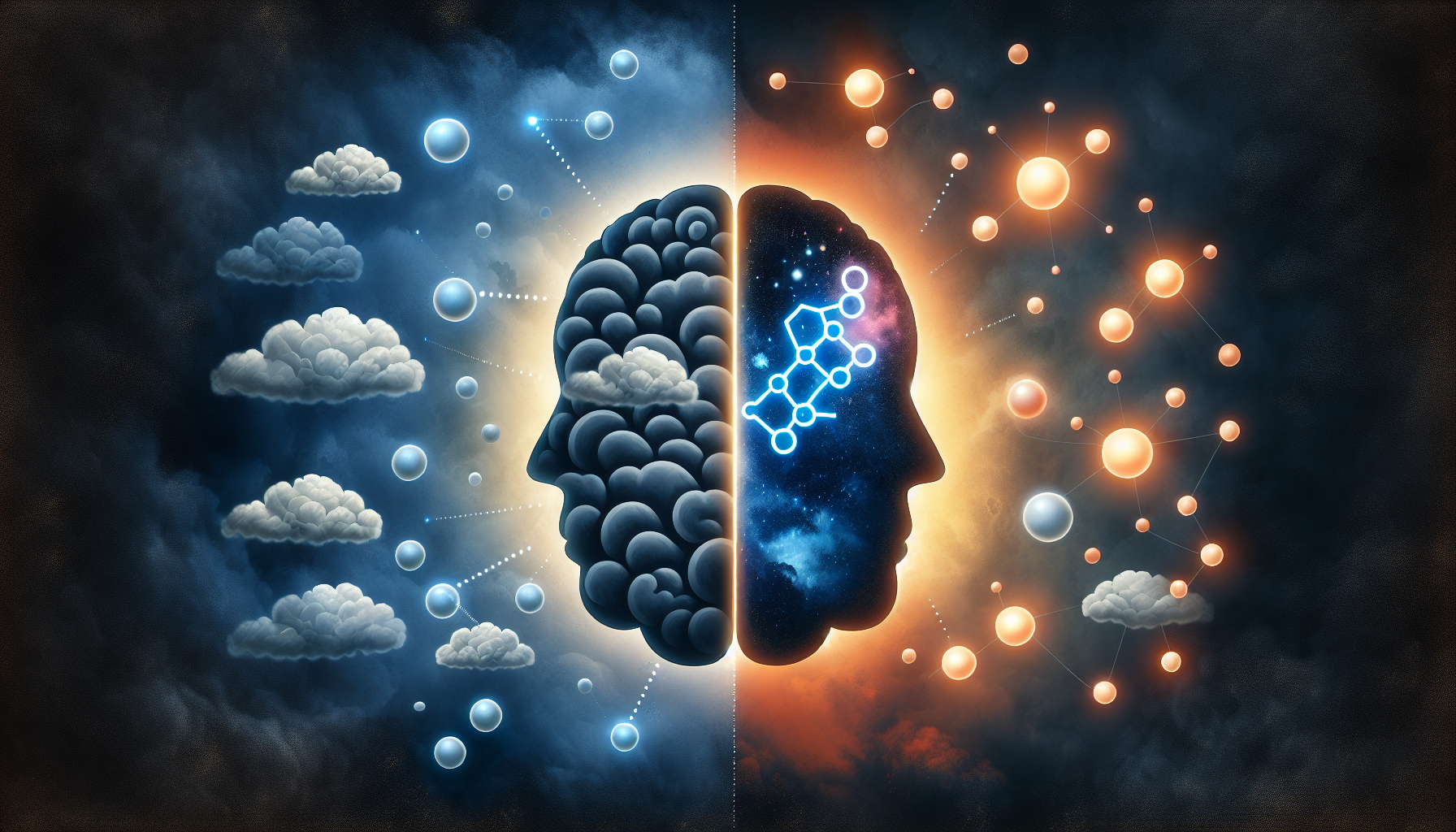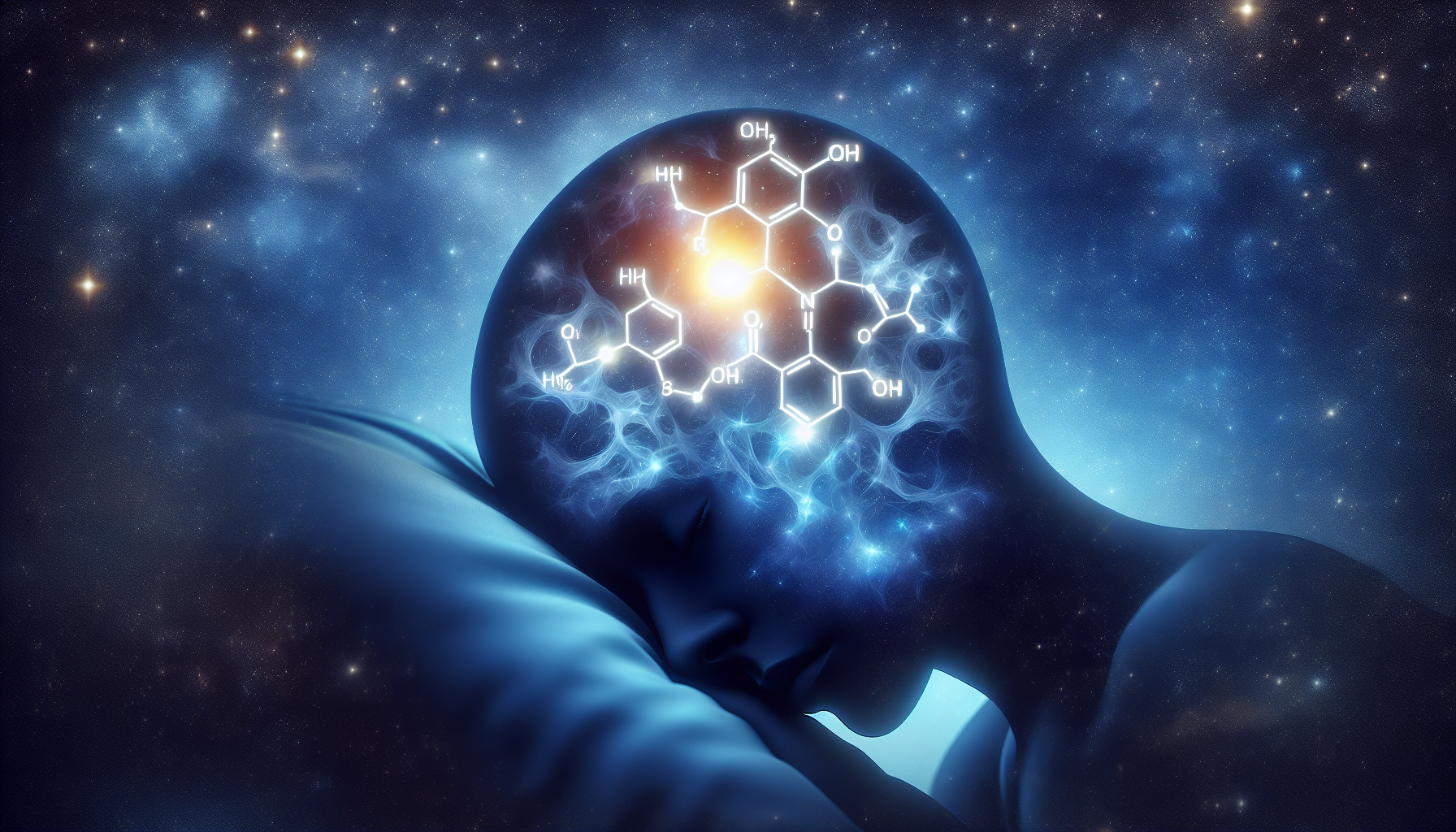When it comes to enhancing sleep and regulating mood, the world of dietary supplements offers a plethora of options. Among these, GABA (Gamma-Aminobutyric Acid) and 5-HTP (5-Hydroxytryptophan) stand out due to their popularity and distinct mechanisms of action. However, a common question arises: Is GABA the same as 5-HTP? While both supplements are renowned for their effects on sleep and mood, they fundamentally differ in how they influence the brain and body. GABA, known for its calming properties, primarily soothes the nervous system and facilitates relaxation and sleep. In contrast, 5-HTP enhances serotonin production, a key neurotransmitter that regulates mood, appetite, and sleep patterns. Understanding these unique effects is crucial in determining which supplement might benefit your specific needs.
This article explores the intricate roles of GABA and 5-HTP in the brain. It provides an in-depth analysis of how GABA aids in calming the nervous system, thus enhancing sleep quality and contributing to a peaceful state of mind. Concurrently, we explore 5-HTP's role as a precursor to serotonin, highlighting its influence on mood regulation, appetite control, and sleep. While both supplements offer potential benefits for sleep and mood, their distinct pathways in the brain account for their different impacts.
An important aspect of this discussion involves the consideration of potential side effects and interactions. Supplements, like any intervention, come with their unique set of considerations. This is particularly pertinent when GABA or 5-HTP are taken in combination with other medications or supplements. Therefore, we emphasize the importance of consulting with a healthcare professional before beginning a regimen of either GABA or 5-HTP. Such consultation ensures safe usage and helps determine the appropriate dosing tailored to individual health needs and circumstances.
This article aims to provide a comprehensive understanding of GABA and 5-HTP, shedding light on their individual roles in brain function and overall well-being. By dissecting their distinct properties and impacts, we hope to guide readers in making informed decisions about these supplements, ultimately contributing to their journey toward improved sleep and mood.
Key Takeaways
- GABA and 5-HTP are supplements that serve distinct purposes in the brain: GABA contributes to calming the nervous system and improving sleep quality, while 5-HTP acts as a precursor to serotonin, regulating mood, appetite, and sleep.
- Both supplements can positively impact sleep and mood, with GABA reducing anxiety and promoting relaxation, while 5-HTP enhances serotonin production, potentially improving mood and sleep patterns.
- Considering potential side effects and interactions, it’s important to consult with a healthcare professional before taking GABA or 5-HTP, especially in combination or with other medications, to ensure safe usage and determine appropriate dosing.
Understanding GABA and 5-HTP: The Basics

Gamma amino butyric acid, or GABA, is the brain’s chief inhibitory neurotransmitter, key to calming the nervous system and inducing relaxation. Its calming effects have made GABA supplements a favored choice among those seeking to manage stress and improve sleep quality.
On the other hand, 5-HTP is a derivative of tryptophan, an essential amino acid. It is a precursor to serotonin, a neurotransmitter critical for mood, appetite, and sleep regulation. This connection to serotonin production has made 5-HTP and GABA a popular choice for those dealing with mood disorders and sleep issues.
While GABA and 5-HTP have significant roles in the brain, their functions are markedly distinct. Where GABA inhibits chemical messages between nerve cells to calm the nervous system, 5-HTP is more concerned with boosting serotonin levels to regulate mood and sleep. When considering the use of these supplements, it’s vital to comprehend these roles.
GABA's Role in the Brain
GABA, short for Gamma-Aaminobutyric Acid, is an inhibitory neurotransmitter that plays a crucial role in the brain. It helps calm the nervous system, contributing to a healthy mind and body by acting as a “brake” on nerve transmission. This neurotransmitter is synthesized in the presynaptic neuron from the precursor glutamate, thanks to a glutamate decarboxylase enzyme. This process maintains the balance between excitatory and inhibitory neurotransmitters, which is fundamental for proper brain function and the integrity of the blood-brain barrier.
GABA impacts multiple brain areas, including the amygdala, hippocampus, hypothalamus, prefrontal cortex, and more. By inhibiting the transmission of other messages, it regulates the pace of information transmission in the nervous system. GABA’s role in the brain contributes significantly to reducing anxiety, managing stress, and promoting sleep. GABA supplements have become increasingly popular for their potential to enhance sleep quality and overall relaxation.
5-HTP's Connection to Serotonin Production
5-HTP, or 5-hydroxytryptophan, is instrumental in producing serotonin, a neurotransmitter that regulates mood, appetite, and sleep. Given this significant role, understanding 5-HTP’s connection to serotonin production helps illuminate its potential benefits.
Research suggests that 5-HTP can aid with depression, anxiety, and sleep disorders. Its ability to increase serotonin levels in the brain can profoundly affect mental and emotional well-being.
5-HTP boosts serotonin levels by acting as a precursor. This means it is directly converted into serotonin, a process that can benefit mood and sleep.
The influence of 5-HTP on serotonin levels and sleep patterns typically becomes noticeable within 6 to 12 weeks. This time frame corresponds to the gradual changes in brain chemistry, highlighting the need for patience and consistency when using 5-HTP.
Comparing Sleep Promoting Effects of GABA and 5-HTP

In the realm of sleep promotion, both GABA and 5-HTP have carved out their niches. GABA’s core role is to promote relaxation and alleviate stress, which are fundamental to enhancing sleep quality. Conversely, 5-HTP elevates serotonin levels, which are vital in sleep regulation. Its effects include reducing sleep latency and influencing wakefulness and sleep patterns.
The nuanced differences in how these two amino acids affect sleep make them ideal for addressing varied sleep issues. Whether it’s trouble falling asleep, staying asleep, or achieving restful sleep, the properties of GABA and 5-HTP can offer potential solutions.
Interestingly, research suggests that the combined administration of GABA and 5-HTP may enhance sleep quality and duration more than either amino acid alone. This synergistic effect makes the GABA/5-HTP mixture a promising solution for individuals seeking improved sleep.
GABA's Impact on Sleep Quality
GABA’s impact on sleep quality is significant. As the brain’s primary inhibitory neurotransmitter, GABA facilitates relaxation, which is a crucial step towards falling asleep. GABA supplements have become a popular sleep aid for individuals struggling with sleep issues.
GABA accomplishes this by:
- Obstructing the reception, processing, and transmission of chemical messages between nerve cells
- Resulting in a calming effect
- Promoting a deep sense of relaxation
- Facilitating the transition to sleep
- Ultimately enhancing sleep quality.
The impact of GABA on sleep quality is associated with:
- The activation of GABA(A) receptors, which promote sleep
- GABA’s ability to reduce stress and enhance sleep
- A decrease in sleep latency, enabling individuals to fall asleep more quickly
- Ultimately improving overall sleep quality.
With its capacity to promote relaxation and diminish anxiety, GABA can efficiently tackle the underlying causes of many sleep problems. This makes it a valuable tool for anyone seeking a natural approach to improving sleep quality.
5-HTP's Influence on Sleep Patterns
5-HTP plays a pivotal role in the regulation of sleep patterns. It facilitates the production of serotonin and melatonin, neurotransmitters crucial for both the initiation and stability of sleep.
5-HTP enhances melatonin production by augmenting serotonin production, which is a vital precursor for melatonin biosynthesis. This impact on melatonin production enables 5-HTP to control the sleep-wake cycle, fostering a natural circadian rhythm.
Numerous scientific studies have shown that 5-HTP can modulate sleep patterns, enhancing sleep stability and subjective nighttime sleep quality, potentially leading to improved overall sleep quality. To investigate subjective nighttime activity further, researchers continue to explore the effects of 5-HTP on sleep.
The influence of 5-HTP on sleep patterns, including sleep duration, typically becomes noticeable within a period of 6 to 12 weeks in normal human subjects. This gradual effect emphasizes the importance of consistent usage when using 5-HTP as a sleep aid.
Mood Regulation: GABA vs. 5-HTP

Although both GABA and 5-HTP hold impactful roles in mood regulation, they target varying aspects of mood disorders. GABA, known for its calming effects, primarily facilitates relaxation to regulate mood.
Conversely, 5-HTP focuses on increasing serotonin levels. Serotonin is a neurotransmitter essential for regulating:
- mood
- cognition
- reward
- learning
- memory
- sleep
- among other physiological functions.
The approaches of GABA and 5-HTP in mood regulation may appear different, yet they complement each other. When used together, their effects can be synergistic, targeting various aspects of mood disorders and potentially offering a more complete solution for mood regulation.
GABA's Role in Reducing Anxiety and Stress
GABA’s role in reducing anxiety and stress is rooted in its function as an inhibitory neurotransmitter. GABA produces a calming effect on the brain by diminishing neuronal excitability and the probability of nerve transmission. This calming effect proves particularly beneficial in managing anxiety, stress, and fear, which can all disturb sleep and overall well-being. By promoting a deep sense of relaxation, GABA can facilitate the transition to sleep and improve sleep quality.
Empirical evidence supports GABA’s efficacy in managing anxiety and stress. Studies have shown improved calmness and reduced worry in participants following GABA supplementation. The anxiety-reducing effects of GABA typically occur within approximately one hour after its administration. This rapid onset of effects makes GABA an excellent choice for individuals seeking quick relief from stress and anxiety.
To further explore the potential of GABA in anxiety management, our article “GABA: The Mystery Neurotransmitter That May Hold The Key To Conquering Anxiety” delves into the specifics of this intriguing neurotransmitter. In it, we review five of the top GABA supplements on the market, providing valuable insights for those interested in using GABA to address their anxiety and stress. Each supplement is analyzed for its effectiveness, potential benefits, and how it compares to others regarding quality and efficacy. This comprehensive review can guide you in choosing the right GABA supplement to meet your individual needs and preferences. For those keen on understanding the nuances of GABA and its role in anxiety management, this article is an indispensable resource.👇
5-HTP's Effect on Depression and Serotonin Levels
5-HTP plays a pivotal role in reducing symptoms of depression by boosting serotonin levels in the brain. Serotonin is a neurotransmitter that plays a key role in mood regulation. Elevated serotonin levels can result in enhanced mood, increased feelings of happiness, and improved emotional stability.
5-HTP’s role in serotonin production has made it a popular choice for individuals dealing with mood disorders. The use of 5-HTP for depression management typically leads to:
- Alleviation of depressive symptoms
- Positive impact on sleep
- Positive impact on mood
- Positive impact on anxiety
- Positive impact on appetite
- Positive impact on pain perception
The influence of 5-HTP on serotonin levels and, consequently, mood regulation underlines the importance of this supplement in managing mood disorders. Whether it’s improving sleep quality or enhancing mood, 5-HTP offers potential benefits for individuals dealing with:
- Depression
- Anxiety
- Seasonal affective disorder (SAD)
- Fibromyalgia
- Insomnia
Side Effects and Interactions: What to Watch Out For

As with any supplement, GABA and 5-HTP have potential side effects and interactions of which users should be cognizant. Some individuals using GABA supplements may experience side effects like:
- seizures
- developmental delays
- movement problems
- severe allergic reactions
- gastric distress
- nausea
- diminished appetite
- constipation
- drowsiness
Moreover, GABA can interact with medications for high blood pressure, potentially leading to a decrease in blood pressure. It’s, therefore, essential to consult with a healthcare professional before starting a regimen of GABA supplements, especially if you’re taking other medications.
With 5-HTP, potential side effects include nausea and diarrhea. These are typically mild and can often be managed by starting with a lower dose and gradually increasing it. However, there’s also a risk of interactions with certain antidepressants and other medications that elevate serotonin levels. As with GABA, discussing any new supplement regimen with a healthcare professional is crucial.
Despite potential side effects and interactions, both GABA and 5-HTP are typically deemed safe when used in recommended dosages. However, they should be used cautiously, especially when combined with other medications or supplements.
Potential Side Effects of GABA
While GABA is generally well-tolerated, some individuals may experience side effects. Common adverse effects associated with GABA supplements include drowsiness, dizziness, and muscle weakness. Other potential side effects include a slight burning in the throat, intermittent and brief shortness of breath, or a moderate drop in blood pressure. However, these side effects are poorly documented and appear relatively rare.
Long-term use of GABA may lead to potential side effects such as:
- abdominal discomfort
- headache
- drowsiness
- slight burning in the throat
- intermittent and brief shortness of breath
Despite these potential side effects, no serious adverse events have been associated with recommended intakes of GABA.
Although GABA’s side effects are generally mild and rare, adhering to usage guidelines and seeking advice from a healthcare professional is advised if considering GABA supplements, especially when taking other medications or dealing with underlying health conditions.
Risks and Interactions of 5-HTP
5-HTP also has potential side effects and risks. Most commonly, people may experience minor side effects like nausea and diarrhea. These are usually temporary and can be mitigated by starting with smaller doses and gradually increasing the dosage.
When considering the use of 5-HTP in combination with other medications, caution should be exercised. There’s a potential for interactions with certain antidepressants, cough medicines, and prescription pain relievers, which could result in elevated serotonin levels. Furthermore, combining 5-HTP with prescription sedative medications may lead to excessive drowsiness.
While these risks and interactions may sound worrying, it’s important to note that they’re associated with high doses of 5-HTP. When used in recommended dosages, 5-HTP is generally considered safe. However, it’s crucial to consult with a healthcare professional before starting a 5-HTP regimen, especially if you’re taking other medications.
Given the potential risks and interactions of 5-HTP, it’s important to follow dosage recommendations and consult a healthcare professional if you’re considering taking 5-HTP supplements. Especially if you’re also taking other medications or have any underlying health conditions.
Combining GABA and 5-HTP for Optimal Results

While GABA and 5-HTP each offer their unique benefits, combining them can provide synergistic effects on sleep and mood. Research has shown that the concurrent use of GABA and 5-HTP can enhance sleep quality and decrease sleep onset latency more than either amino acid alone.
However, it’s crucial to understand the recommended dosages for each supplement. For GABA, dosages can vary significantly, ranging from 10 mg to 1000 mg based on its intended use. For 5-HTP, the maximum dosage for sleep is 90mg.
It’s recommended to take GABA and 5-HTP together to achieve optimal results. However, it’s always important to consult a healthcare professional for personalized dosage recommendations, and to avoid potential interactions with other medications.
Synergistic Effects on Sleep and Mood
The combined use of GABA and 5-HTP can result in heightened relaxation and stress relief, thanks to their synergistic effect. This combination can also enhance sleep quality, making it a promising solution for better sleep and mood regulation.
The combination of GABA and 5-HTP enhances sleep quality by promoting relaxation and modulating sleep episodes. This makes it a valuable tool for anyone seeking a natural approach to improving sleep quality.
In terms of mood regulation, the combination of GABA and 5-HTP contributes to improving mood by concurrently increasing levels of GABA and serotonin. This synergistic effect makes combining these two supplements a promising solution for individuals seeking improved mood regulation.
The combination of GABA and 5-HTP can offer a more comprehensive approach to addressing sleep and mood issues. By providing calming and mood-boosting effects, this combination can help individuals achieve a higher quality of sleep and a more positive mood state.
Dosage Recommendations and Precautions
It’s imperative to grasp the recommended dosages when combining GABA and 5-HTP. The optimal dosage of GABA for enhancing sleep quality is 300 milligrams (mg), which is taken one hour before bedtime for four weeks. However, it’s worth noting that the most commonly studied dosage is 100 milligrams of GABA.
On the other hand, the recommended daily dosage of 5-HTP for alleviating symptoms of anxiety and depression typically ranges between 150-800 mg for adults.
Surpassing the recommended dosage for either GABA or 5-HTP could result in potential side effects. With GABA, these may include a burning sensation in the throat, low blood pressure, shortness of breath, and tingling in the body. For 5-HTP, potential side effects include migraines, headaches, and other adverse reactions.
Given these potential side effects, it’s vital to adhere to dosage recommendations and seek advice from a healthcare professional before initiating a regimen of GABA or 5-HTP, especially when used in combination.
Deciphering the Roles of GABA and 5-HTP: A Comprehensive Summary
In exploring the intricate world of dietary supplements for sleep and mood enhancement, GABA (Gamma-Aminobutyric Acid) and 5-HTP (5-Hydroxytryptophan) emerge as two distinct yet potentially complementary options. GABA, functioning as the brain’s primary inhibitory neurotransmitter, is pivotal in calming the nervous system, facilitating relaxation, and improving sleep quality. On the other side, 5-HTP acts as a precursor to serotonin, a neurotransmitter integral to regulating mood, appetite, and sleep patterns. The potential synergistic effect of combining these two supplements offers a promising avenue for individuals seeking to enhance both sleep quality and mood regulation. However, this approach requires a nuanced understanding of each supplement's mechanism of action and potential interactions.
In addition to considering the specific benefits and interactions of GABA and 5-HTP, it’s crucial to be aware of the broader context of amino acid neurotransmitters in brain health. Our article “Which is Better, GABA or Glycine? Exploring the Pros and Cons of Key Amino Acid Neurotransmitters” dives into this topic, providing insights into how GABA compares with Glycine, another significant amino acid with neurotransmitter properties. This comparison further enriches the understanding of GABA’s role and impact when used with other supplements like 5-HTP. For those considering supplement regimens, it’s imperative to understand the potential side effects, adhere to recommended dosages, and consult a healthcare professional. This guidance is particularly vital when blending supplements such as GABA and 5-HTP, ensuring a safe and effective approach to enhancing sleep and mood. To delve deeper into the nuances of these amino acid neurotransmitters and their implications for brain health, readers are encouraged to explore our detailed analysis in the link below.👇
Frequently Asked Questions
What is a good substitute for GABA?
Consider trying prescription drugs with similar mechanisms of action, such as Lyrica, amitriptyline, or carbamazepine, as substitutes for GABA. These medications can provide similar effects for the treatment of seizures, neuropathic pain, anxiety, and migraines.
Who should not take GABA supplements?
If you have a severe allergic reaction to GABA or any of its components, or if you have inherited disorders of amino acid metabolism, you should not take GABA supplements. It may not be appropriate for you due to these conditions.
Can I take GABA L-theanine and 5-HTP together?
Taking GABA, L-theanine, and 5-HTP together is generally safe, as there are no known contraindications for GABA and 5-HTP. It is important to consult with a healthcare professional before combining any supplements.
How do I know if my GABA is low?
If you are experiencing mood issues like anxiety and depression, irritability, restlessness, poor sleep, seizures, or epilepsy, it could be a sign of low GABA levels. Low GABA activity can lead to anxiety, depression, insomnia, and mood disorders.
What are the main differences between GABA and 5-HTP?
The main differences between GABA and 5-HTP are that GABA facilitates relaxation and improves mood regulation, while 5-HTP focuses on increasing serotonin levels. When used together, they may have a synergistic effect on mood regulation.
Thanks for taking this journey to explore the differences and similarities between GABA and 5-HTP. And, if you want to add to your library of knowledge, you should check out the other articles mentioned and linked above. It never hurts to add to your knowledge arsenal!
Also, please return soon to check out our next review of another incredible supplement – we’re always looking out for YOU!
*We are not qualified medical advisors. The content here is only based on our personal opinions and should NOT be used as a substitute for a healthcare professional's advice!











Member discussion